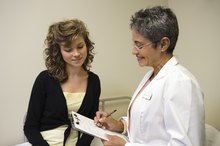Symptoms of Klebsiella Bacteria
Klebsiella bacterial infections cause symptoms that vary depending on the site of the infection. People often develop klebsiella infections because they have impaired immunity from being sick or required medical interventions. Mechanical ventilators, indwelling tubes that drain urine, burns and open wounds all favor the development of klebsiella infection. Symptoms include those of pneumonia, urinary tract infection and skin and soft tissue infections 3. They tend to develop in people who are hospitalized or being cared for in a long-term facility.
If you are experiencing serious medical symptoms, seek emergency treatment immediately.
Pneumonia
People are at risk of developing klebsiella pneumonia if they are diabetic, chronic alcoholics or have an underlying lung disease. Those who are living in long-term care facilities or are currently hospitalized and breathing with mechanical ventilators are at even higher risk of developing a lung infection from Klebsiella. The sudden onset of fever, fast and shallow breathing and an increasing amount of secretions in the breathing tube may herald the occurrence of pneumonia. If the infection extends to the tissues lining the surface of the lungs, they may also experience chest pain.
- People are at risk of developing klebsiella pneumonia if they are diabetic, chronic alcoholics or have an underlying lung disease.
- Those who are living in long-term care facilities or are currently hospitalized and breathing with mechanical ventilators are at even higher risk of developing a lung infection from Klebsiella.
Urinary Tract Infections
What Are the Causes of Infiltration of Lungs?
Learn More
Those with an infection from an indwelling urinary catheter -- a tube that drains urine from inside the body -- may experience high fever, lower abdominal pain, bloody urine, chills, back pains and vomiting. Because various organisms normally contaminate catheters without causing any symptoms, the laboratory identification of a significant number of bacteria is needed so appropriate antimicrobial treatment can be started.
Abdominal Infections
Abnormal collections of fluid within the organs in the abdomen may result from a variety of organisms, including the Klebsiella bacteria. Such infections produce symptoms such as fever, persistent abdominal pain, chills, nausea and vomiting. Prompt drainage of the fluid collection along with the administration of the appropriate antibiotics is necessary to treat the infection. Although these infections are often found in those with diabetes, young and healthy individuals have also been affected.
- Abnormal collections of fluid within the organs in the abdomen may result from a variety of organisms, including the Klebsiella bacteria.
- Prompt drainage of the fluid collection along with the administration of the appropriate antibiotics is necessary to treat the infection.
Surgical-Site and Soft-Tissue Infections
CRV Infections
Learn More
The longer the hospital stay and the longer the surgical procedure, the greater the risk of developing surgical wound infections. A surgical wound infection should be suspected if fever is accompanied by swelling and color changes or the sudden redness of the tissues surrounding a burn or post-operative wound. If you are obese or have diabetes, an ongoing infection nearby or some other medical condition that makes you susceptible to infections, you may notice nonhealing of your surgical wound even with antimicrobial treatment.
Warnings
Because of the possibility of widespread infection with drug-resistant Klebsiella, a doctor should be consulted right away if symptoms do not improve after antibiotic treatment or if breathing difficulties, lethargy, altered behavior or changes in consciousness develop. These may indicate the onset of life-threatening widespread infections.
Related Articles
References
- Centers for Disease Control and Prevention: Klebsiella Pneumoniae in Healthcare Settings
- CDC: MMWR: Guidance for Control of Infections With Carbapenem-Resistant or Carbapenemase-Producing Enterobacteriaceae in Acute Care Facilities
- CDC: Catheter-Associated Urinary Tract Infections
- Diagnosis, Prevention, and Treatment of Catheter-Associated Urinary Tract Infection in Adults: 2009 International Clinical Practice Guidelines From the Infectious Diseases Society of America
- Ashurst, John V, Dawson, Adam. Klebsiella pneumonia, StatPearls, November 22,.
- Centers for Disease Control and Prevention. Klebsiella pneumoniae in healthcare settings. November 24, 2010.
- Paczosa MK, Mecsas J. Klebsiella pneumoniae: Going on the offense with a strong defense. Microbiol Mol Biol Rev. 2016;80(3):629-61. doi:10.1128/MMBR.00078-15
Writer Bio
Isobelle Galeon is a physician scientist with clinical training in Internal Medicine. She earned her Graduate Certificate in Public Health Sciences and Masters in Public Health (Epidemiology) from the University of Colorado Denver. She is currently completing her PhD in Clinical Sciences and training in translational medicine at the same university.








